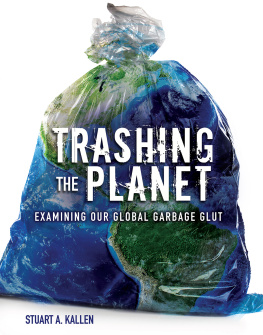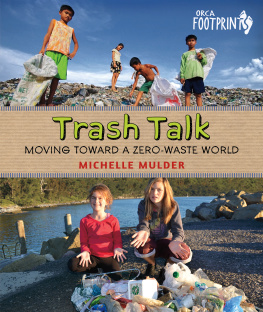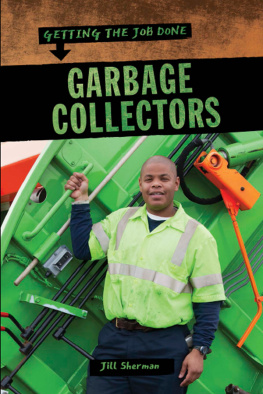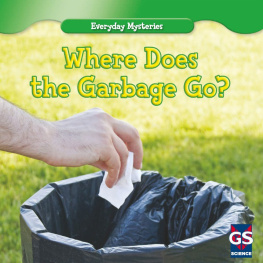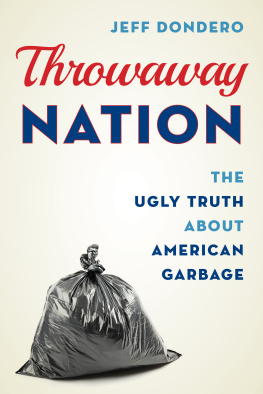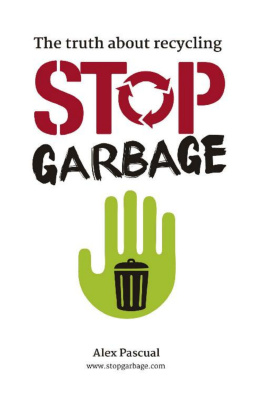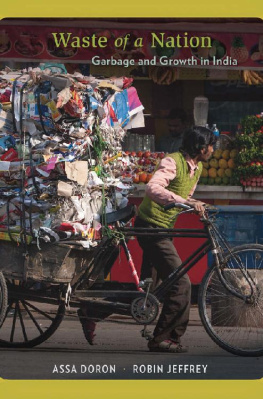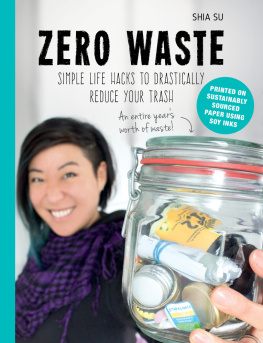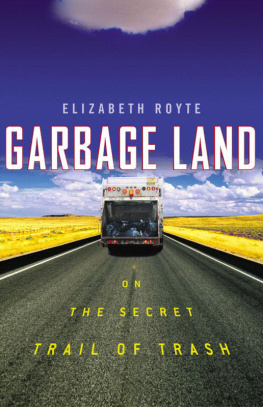Outsmart Waste
Outsmart Waste
The Modern Idea of Garbage and How to Think Our Way Out of It
Tom Szaky

Outsmart Waste
Copyright 2014 by Tom Szaky
All rights reserved. No part of this publication may be reproduced, distributed, or transmitted in any form or by any means, including photocopying, recording, or other electronic or mechanical methods, without the prior written permission of the publisher, except in the case of brief quotations embodied in critical reviews and certain other noncommercial uses permitted by copyright law. For permission requests, write to the publisher, addressed Attention: Permissions Coordinator, at the address below.

| Berrett-Koehler Publishers, Inc.
235 Montgomery Street, Suite 650
San Francisco, California 94104-2916
Tel: (415) 288-0260, Fax: (415) 362-2512
www.bkconnection.com |
Ordering information for print editions
Quantity sales. Special discounts are available on quantity purchases by corporations, associations, and others. For details, contact the Special Sales Department at the Berrett-Koehler address above.
Individual sales. Berrett-Koehler publications are available through most bookstores. They can also be ordered directly from Berrett-Koehler: Tel: (800) 929-2929; Fax: (802) 864-7626; www.bkconnection.com
Orders for college textbook/course adoption use. Please contact Berrett-Koehler: Tel: (800) 929-2929; Fax: (802) 864-7626.
Orders by U.S. trade bookstores and wholesalers. Please contact Ingram Publisher Services, Tel: (800) 509-4887; Fax: (800) 838-1149; E-mail: customer.service@ingrampublisherservices.com; or visit www.ingrampublisherservices.com/Ordering for details about electronic ordering.
Berrett-Koehler and the BK logo are registered trademarks of Berrett-Koehler Publishers, Inc.
First Edition
Paperback print edition ISBN 978-1-62656-024-6
PDF e-book ISBN 978-1-62656-025-3
IDPF e-book ISBN 978-1-62656-026-0
2013-1
Cover design by M.80/Wes Youssi.
Composition by Gary Palmatier, Ideas to Images.
Elizabeth von Radics, copyeditor; Mike Mollett, proofreader; Alexandra Nickerson, indexer.
To Edith and Martin Stein
Contents
by Deepak Chopra
Foreword
Waste is natural to every living system.
We all consume and at some point eliminate. Eventually, everything and everyone has an end of life.
We may frown on someone who litters or tosses a cigarette butt on the street, but is putting a candy wrapper in the garbage binonly for it to be trucked to a landfillmuch better for the planet? With the more than 4 pounds of garbage the average American discards every day, our individual contributions to this collective trove of waste are hard to countenance, and, largely, we dont.
Globally, humanity has evolved into the modern disposable society, readily buying and discarding non-recyclable products and packaging that were designed to enhance consumer convenience and regular repeat purchases. For the most part, consumersand I am very much a part of thisbuy disposable items and discard them, and we are largely inattentive to where our waste goes. With an addictive satisfaction (but largely without conscience), we each contribute to vast concentrations of waste that nature cant digest and that add toxins into the atmosphere. Our blind eye to how much waste we produce and contribute is a spiritual breach. The flush syndrome is very much an aspect of our shadow, and it festers into a collective disrespect for our homeour planet.
Tom Szaky is a waste pioneer and an eco-capitalist. At age 31 hes running a company that operates in 24 countries, collecting and recycling waste that is otherwise landfilled or incinerated. In this book Tom illuminates pathways to finding gold in garbage heaps and, more importantly, explains how human-created waste can be reused, recycled, and reintegrated into our commercial systems. Through his company, TerraCycle, and this book, Tom is tackling a seemingly unsolvable global problem to which each individual contributes. Thanks to this book, I can no longer acquire and discard unconsciously, and as Ive long said, change begins with awareness.
Toms prescription isnt abstinence: He too likes to buy and own, and he is very much aware of the short life cycle of most goods. Rather, Tom suggests that we might consume our way out of the problempractically aligning the economic forces that drive consumerism to a positive role in the solution. Tom brings the global waste picture into new focus, and in so doing he may help us solve the individual and societal compromises we each make when we somewhat blindly and seemingly helplessly discard and pollute our planet, our home, and our corporal body.
Deepak Chopra
Introduction
The Unique Nature of Garbage

Vadim Kozlovsky/Shutterstock.com
Tommaso Lizzul/Shutterstock.com
Garbage is a uniquely human concept that does not exist in nature. In nature the output, or waste, of one organism is the useful input for other organisms. Feces from a fox can become food for a berry bush, whose fruit can later become the food for a bird that may end up as supper for the fox whose droppings started it all. This natural harmony is rooted in the principle that the outputs of organisms tend to bring significant, if not fundamental, benefits to other organisms.
With the creation of synthetic materials, humans have broken this natural harmony. While plastics and other man-made materials have allowed us to innovate and create products cheaply, when they hit the end of their useful life they become useless outputs that nature doesnt know what to do with. Not only are many of these new products relatively cheap to buy but many of us typically dont even have to have the actual resources to buy them; gaining debt (through credit cards and other loans) is perhaps the easiest it has ever been.
Of course, there are ways to better realign ourselves with the harmony of nature. Buying products differentlybuying consciously, buying durable, buying used, or simply not buying at allis a straightforward way that individual consumption can have a smaller impact on nature.
It is quite difficult, however, to lead a life in which we do not buy anything or buy only our bare essentials (food and a few scraps of fabric to cover our bodies). I have started down the path of rethinking what I buy and have found it to be an uphill battle. Like most people, I enjoy acquiring things; the feeling when I open a box with something new to possess inside it is still thrilling, and that fleeting thrill is encouraged by a global culture of rampant consumerism. Just think of how many stores and advertisements we pass by on a daily basis that encourage more and more consumptionall seeming to scream, Youll gain happiness by buying me!
We see fish with bellies full of plastic and birds making nests from cigarette butts, and the problem only compounds with our tendency to overconsume. Easy and cheap access to many goods, a dramatic increase in global population, and a throwaway consumer culture have resulted in a global garbage crisis.
Next page

